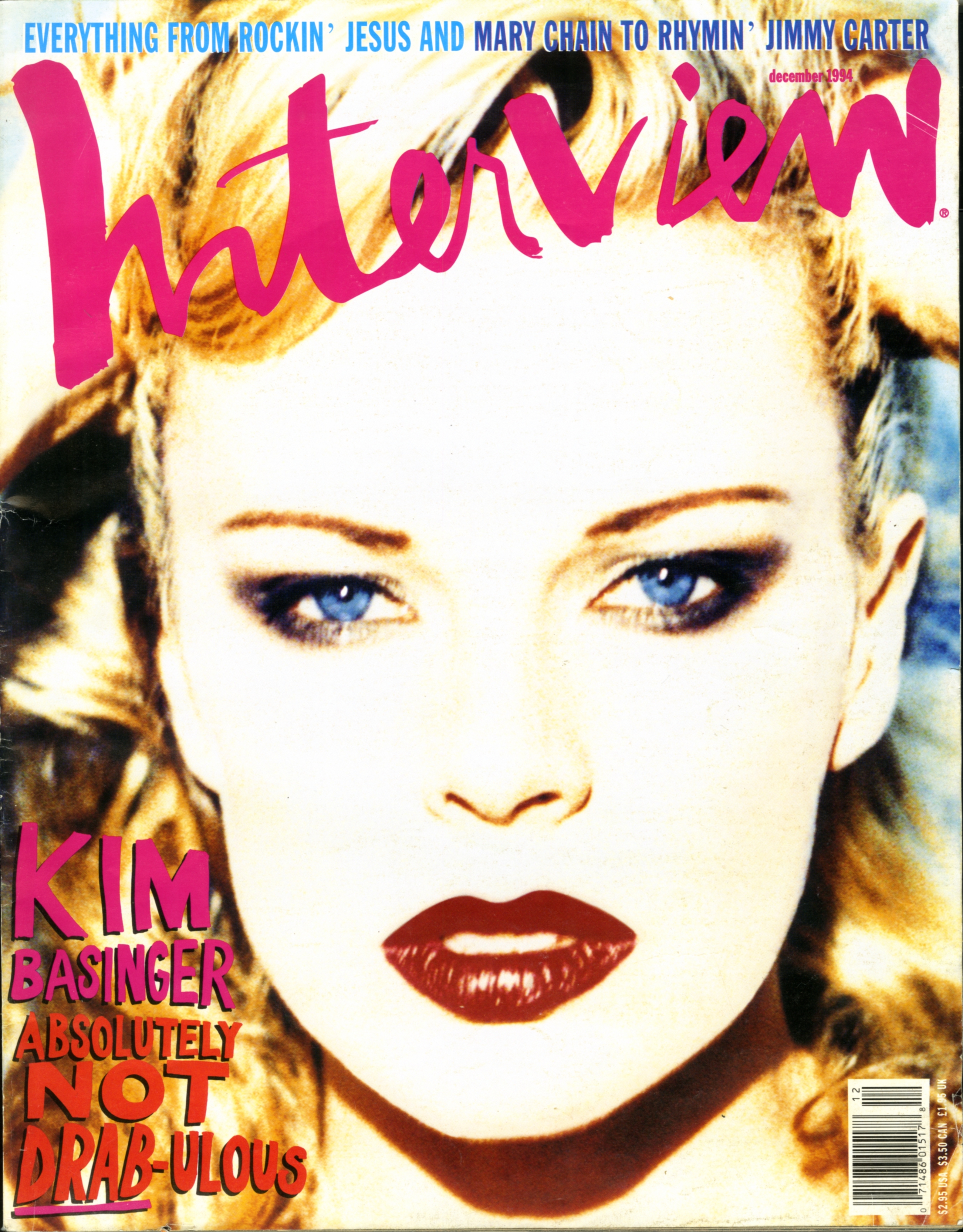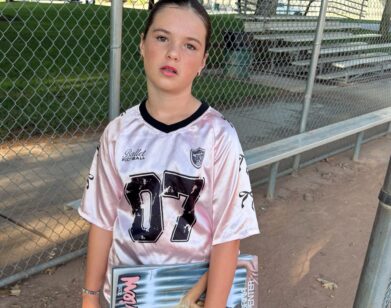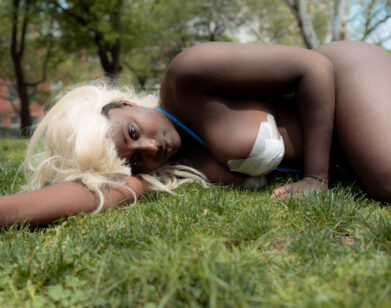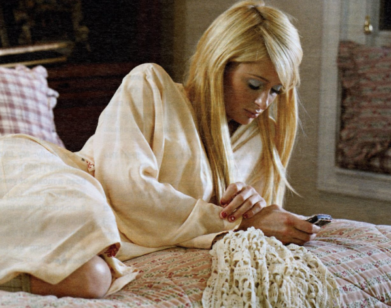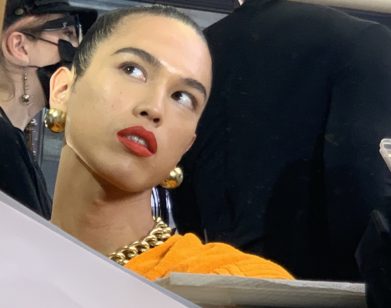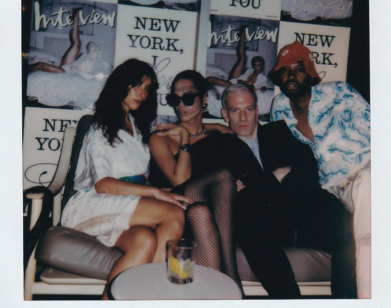On Second Thought: Kim Basinger
On Second Thought offers iconic subjects the rare chance to revisit an interview from our archives, and reckon with the good and the bad of it. Hover over the highlighted text to see Kim Basinger’s updated thoughts on her cover story.
In our December 1994 issue, cover star Kim Basinger talked about what it’s like to be an outsider in Hollywood, introducing her daddy to Sophia Loren, and her cow, Henry.
In the 24 years since, Basinger gave birth to her daughter Ireland, said goodbye to both Henry and her father, and continued acting in films across all genres—8 Mile [2002], Fifty Shades Darker [2017]. Here, she annotates her original responses to Brendan Lemon’s 1994 queries.
As Prêt-à-Porter’s firm yet somehow flustered FAD-TV reporter, Kitty Potter, a fixture at the Paris collections, Kim Basinger chases up and down the boulevards in pursuit of an assortment of actors playing recognizable types (from Anouk Aimee to Tim Robbins) and real-life celebrities playing themselves (from Thierry Mugler to Cher). It’s the second time the actress has worked with director Robert Altman—the first being Fool for Love [1985]—and this time he has coaxed a delightful comic performance from her.
The chase has become Basinger’s signature. Whether in No Mercy [1986], Nadine [1987], Batman [1989], or The Getaway [1994], she’s always pursuing—or being pursued. When I caught up with her one recent afternoon in New York, she was slightly more settled, at least until introductions were completed. She thereupon turned the official tables, quizzing me about my love life, my childhood, even my eyeglasses. Struck less by her physical beauty—she has a remarkable glossy complexion—than by her infectious volubility, I answered truthfully, and hoped she would return the favor.
BRENDAN LEMON: How much time did you have between being asked to do Prêt-à-Porter and starting work on it?
KIM BASINGER: A week. [Robert] Altman had conceived my part with someone else in mind.
LEMON: You just happened to be in Paris when Altman recast the role of Kitty Potter?
BASINGER: Yes. I was doing publicity for The Getaway; people were coming in from all over the world to do six-minute interviews. Then, during my lunch hour, [Altman’s people] would race me over to a fashion house—two houses—fit me, and then it was back to the hotel for more press. The junket ended, I think, on Saturday, and Sunday morning I was [snaps fingers] up for Altman.
LEMON: So you didn’t have any time to prepare?
BASINGER: I was thrown into this role, and so much of it was improvisational. It was classic Altman—just get out there and do it.
LEMON: What advice did Altman give you?
BASINGER: The first day, Altman sat all the members of the cast down and said, “With this mixing of fantasy and reality, with your being at these real fashion shows and being a participant or a part of the audience, I just want you to do one thing. I want you to stay in character. No matter what happens.”
LEMON: Tell me about your clothes in Prêt-à-Porter.
BASINGER: Whatever show is on, I dress in that designer’s clothes. Some of them were totally unwearable. Nobody interviewed Kitty Potter about what she wore. I would have loved to hear what she would have said about some of this stuff.
LEMON: Since you were shooting at actual fashion shows, where did you dress for Kitty Potter?
BASINGER: I’d dress at my hotel. They would pick me up totally dressed with my makeup on and my hair done. I was very unused to that. I mean, shooting this film was like being out with a bunch of gypsies and a camcorder.
LEMON: Not a lot of time to adjust your appearance for the camera, then?
BASINGER: Well, I’m not very comfortable with looking at myself in the mirror before I do a scene, anyway. It really throws me.
LEMON: But don’t you like to be a little off balance before a scene?
BASINGER: I love to be nervous before a scene. I remember that Jack Lemmon, who is one of my favorite actors of all time, says that the day he stops being nervous is the day he should leave the business. This movie was absolutely the most terrifying thing I’ve ever done. I cried every night.
LEMON: But why would appearing at fashion shows terrify you? You used to be a Ford model.
BASINGER: I had never actually been to fashion shows. I think the first fashion show I ever went to in my life was when Armani flew me to Milan. And that was two years ago.
LEMON: How did you decide that your character would be an ex-weather girl with a southern accent?
BASINGER: I had to make her up! She came out of left field because Altman really didn’t know who Kitty Potter was. And I don’t think he even knew who she was at the end of the shoot. I sure as hell didn’t know who she was, and I really did not know what this movie was about. Even when I was on the plane leaving Paris after so many months, I honestly didn’t know. Doing this movie was like one large flashbulb going off.
LEMON: Who came up with the name Kitty? Was that Altman’s joke on the fact that you love animals?
BASINGER: The name was totally Bob. He used to giggle every time he heard “Kitty.”
LEMON: If working with Altman is so disorienting for you, why do you keep doing it? I hear your next movie might be Altman’s film about his hometown, Kansas City.
BASINGER: We can’t tell you about that yet, but I can tell you one thing about Altman: I trust him. I trust that he knows what’s real. That was my whole take on him when I worked with him for the first time on Fool for Love. I think that’s what we’re all striving for—to look and say, “Well, that was a real moment.”
LEMON: Were there any consolations during the hectic time you had in France?
BASINGER: Well, I brought my daddy over right before the 50th anniversary of the D-Day invasion, of which he had been a part, and the most amazing thing occurred. Let me back up a second and say that when we were kids, my daddy used to show me and my four siblings pictures of him in Normandy during the war, pictures of his jeep and of this little French boy who he lifted up on his shoulders. And I told my daddy, “I hope someday you can go back to France.” And so in May of this year, I got my daddy on a plane. And to make a long story short, he stays in the hotel with me in Paris, I take him to the set, and he meets certain people who are part of his youthful past, like Lauren Bacall and Sophia Loren. We drive out to Normandy to see the cemetery and the beach. Everything is in my daddy’s pockets, especially the pictures of the child. We visit the town The Longest Day movie was based on—you know, the one where Red Buttons hangs by his parachute from a steeple—and I took a camera and I re-created all of the pictures that we had of this town. Now, the most amazing thing is this: We go into a coffee bar and I say, “Daddy, where are those pictures of that little kid?” And she says, “Go next door. There’s a family-owned shop that’s been there for 50 years. If anybody around here knows, they will.” She was making it sound sort of dire.
We go next door, we bring out the picture of this little boy, and we show it to a woman who has on a pair of glasses. The woman looks at the little boy in the picture, looks up over her glasses, and the goes and gets another woman out of the back. She looks at the picture, points at the little boy and says, “This is my father.” He had recently died of cancer, at age 56. And my father and this woman sat in the store and cried together. After all the crying, they hugged each other and promised to keep in touch.
LEMON: Listening to you talk about your father, I can’t help thinking about what it must have been like for you, growing up in Georgia.
BASINGER: Oh, I was already off to college—out of there—years before I actually came to New York to model. I wanted to be a writer; I wanted to sing.
LEMON: And you were already spending a lot of time with animals.
BASINGER: Basically, my work in the last 10 years has been for the protection of animals and it has opened me up to every organized animal-rights group.
LEMON: And they all want you to get involved.
BASINGER: Oh it’s unbelievable, but I understand why. How many times a day are you amazed by man’s ability to be so inhumane? I have to get through all these tears about animals, though, so I can do something about it. Animals don’t need your tears; they need your help.
LEMON: Has your activism brought results?
BASINGER: The governor of California, Pete Wilson, recently signed a bill offering protection to diseased and crippled farm animals. We worked very hard to get this act, the first of its kind in the country.
LEMON: Do you feel that some of your work for the protection of animals has been misunderstood?
BASINGER: I cannot really be responsible for other people’s thought processes. I try not to be too judgmental of others, even though I would love to think that the definition of the word animal will change somehow before I leave this planet. I don’t know whether it will or not. As far as I’m concerned, I don’t eat meat. I still eat sushi, though I’m trying my best to have my last sushi roll.
LEMON: What about the attention you and your husband, Alec Baldwin, got when you protested against the treatment of the Central Park carriage horses in Manhattan?
BASINGER: That came out of a longtime concern. When I was 17, I moved to New York to be a Ford model, and I was walking across the park in the summer and I saw these horses for the first time. One of them fell; he was dying of the heat on the streets of New York. And I went, “What is this?” And ever since I’ve been totally against carriage horses. I’d rather talk about that than about how I am perceived in ways that have not an iota of truth.
LEMON: What do you think about people who think of your animal-rights work as an instance of radical chic?
BASINGER: It’s not all that radical. I just feel passionately about the horses and I will until it’s no longer a tradition in New York. Time should change traditions.
LEMON: I know you have many animals. Where do you keep all the critters?
BASINGER: Well, Alec and I are looking for a farm because I have a cow named Henry.
LEMON: You have a cow named Henry?
BASINGER: Yeah, named after Thoreau. We keep it at a farm sanctuary in California.
LEMON: What does Alec think of the animals in your life?
BASINGER: Different things. Lately he’s been so bound up in politics.
LEMON: Do you want him to run for office?
BASINGER: I’m not prepared to say … Other than that I want him to be happy. I kid people all the time now. When anybody comes up and says, “When are we going to get Alec in Washington?” I look at them and say, “Over my dead body.” [laughs]
LEMON: You’ve talked so little about the Boxing Helena lawsuit in the press—except to say how stalwart Alec has been through it all. I know that even though an appeals court recently over-turned the original multimillion-dollar judgment against you, it is ongoing. How do you feel about the case at this point?
BASINGER: There has not been an emotion discovered yet that could describe the way that I have felt. If I had to describe this whole thing, I would say that it’s been a very expensive education. Not one that I think any of the Seven Sisters schools could provide. It’s almost surrealistic when you’re going through it. I was like a subject in a painting, I’d keep saying, “Can I come in out of the cold?” Imagine Helga saying to Wyeth, “Do I have to take off all my clothes here?”
LEMON: The media heightened the exposure.
BASINGER: The media paint ugly pictures about you. And those original jurors—it’s all about what they read in People or Us or whatever they could get. But I knew what would happen as soon as the other side’s attorney—it was very funny—stood up and focused the whole trial by saying, “Yeah, we know how it all feels for the so-and-so girl who’s got everything she wanted, the pretty girl.” Well, then I knew.
LEMON: All the financial stuff surrounding the case put a lot of attention on your career choices. I want to do my own career focus for a second…
BASINGER: Do we have to? O.K., let’s go.
LEMON: Nadine?
BASINGER: I loved that.
LEMON: Your Blake Edwards movies, The Man Who Loved Women [1983] and Blind Date [1987]?
BASINGER: He’s one of those instinctive directors who would just hire you, having not ever seen you. I love those gamblers.
LEMON: 9 ½ Weeks [1986]?
BASINGER: That was a very difficult film. I’ve got so many more hours of it than you were able to see. I always wished [director] Adrian Lyne would have recut it for the people who really did care about it. But it really helped me tremendously as an actress.
LEMON: People just remember it as steam heat.
BASINGER: When you work with Adrian it’s a love-hate thing. You hate him because he wants you to do this, and you love him when it all goes well.
LEMON: The Getaway?
BASINGER: That was the first movie I saw prior to its coming out, because the producers wanted us to make sure little parts that we wanted had stayed in. Watching it was really nerve-wracking. But some of that movie I really enjoyed.
LEMON: What was your worst movie experience?
BASINGER: You know, I can’t say that I’ve really had a bad experience. Even with The Marrying Man [1991], really, because so many good things come of that. I got to sing, and that is my truest love of all, that and writing. I got to do a live recording with Stan Getz!
LEMON: Who else do you dream of working with?
BASINGER: You know what’s funny? After all the years I’ve been in Hollywood, I still don’t know a lot of the directors and producers who are working today. I’ve never met them. I’m not a real social person—I’m shy—and a lot of the business is just social. It really is. I don’t think it’s a bad game. But early on I didn’t know there was a game. I know now.

